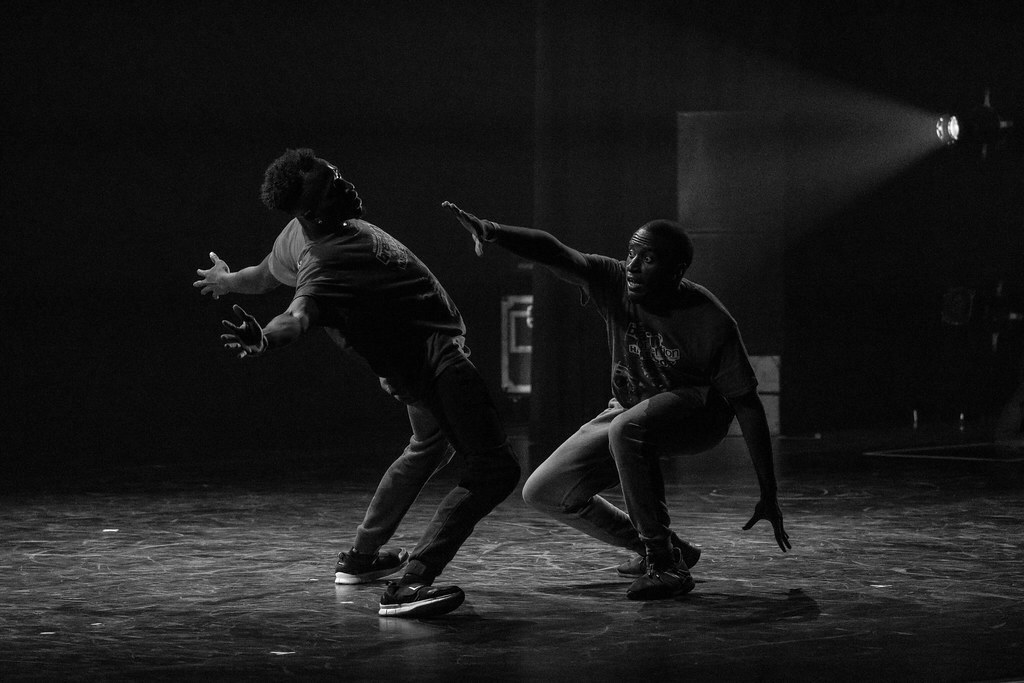The first evening of my first student exchange in Germany was dedicated to integration. Students from the German university prepared a welcome bonfire for us. I remember that at first I was a little stressed about whether I could handle speaking German, but the friendly atmosphere made me have a lot of fun, and my uncertainty about my language skills very quickly faded into the background. Only when we all gathered around the fire and started telling each other stories did my first doubts emerge. As I listened to the stories of my new classmates, I noticed that there are two past tenses in German that intertwine every now and then: the Perfekt and the Präteritum. Admittedly, I had learned about them before, but the moment I wanted to tell my interesting story I suddenly found everything mixed up. I didn’t know which tense I should use, or how to do it correctly, and I lost my confidence.
Now I know that my worries were quite unnecessary and I very much regret that I did not dare to speak up. The truth is that it doesn’t matter which tense I would have used, because it’s actually possible to use them alternately and it’s practically impossible to use them incorrectly. What’s more, 99% of the time only one past tense is used, so knowing it would be completely sufficient for me to carry on a conversation – as you will learn in this article.
How many past tenses are there in German?
In German, you have 3 past tenses to choose from:
- Perfekt,
- Präteritum,
- *Plusquamperfekt.
In fact, most of the time only one of them is used in spoken language: the Perfekt tense. The Präteritum tense (also called Imperfekt) is used mainly in writing and official language. So you’ll encounter it in newspapers, in books, on television or on the radio.
*The Plusquamperfekt tense is the so-called past perfect tense. It is used to indicate which of two past actions happened earlier. In reality, it is used very rarely.
Perfekt Past Tense
Although the past tense Perfekt is otherwise known as the compound past tense, it is actually the easier German past tense and Germans use it in everyday speech 90% of the time. Its name comes from the fact that you need two verbs to form sentences in this tense: the so-called auxiliary verb (haben or sein) and the main verb. What may seem a little strange and unnatural to you is that in the past tense of Perfekt, the main verb, i.e. the one that informs us about what happened, occurs at the very end of the sentence.
For example, if you want to talk about what you did in the past, every sentence will start with Ich habe… or Ich bin… (Ich habe will be used much more often, but more about that in a moment). While this is monotonous, at the same time it definitely makes it easier to use the past tense. See more example sentences here:
| German | English |
|---|---|
| Ich bin um 8 Uhr aufgewacht. | I woke up at 8 o’clock. |
| Ich bin mit dem Hund spazieren gegangen. | I went for a walk with the dog. |
| Ich habe gestern einen leckeren Kuchen gemacht. | I made a delicious cake yesterday. |
| Ich habe schon zwei Kaffees getrunken. | I’ve already had two coffees. |
| Ich habe ein interessantes Buch gelesen. | I read an interesting book. |
| Ich habe Deutsch gelernt. | I learned German. |
| Ich bin um 21 Uhr eingeschlafen. | I fell asleep at 9 pm. |
The sentence Ich habe gestern einen leckeren Kuchen… already provides us with a lot of information. What is still missing here is the main verb, which we place only at the very end of the sentence. It is this that gives the sentence its final meaning. Of course, as it is in German, we must still remember to conjugate it properly. The verb form for the past tense is called Partizip II. For regular verbs, we form it by adding the prefix ge- and the ending -t to the subject of the verb. See these examples:
| German | English |
|---|---|
| Ich habe gestern einen leckeren Kuchen gemacht. | I made a delicious cake yesterday. |
| Ich habe gestern einen leckeren Kuchen gekauft. | I bought a delicious cake yesterday. |
| Ich habe gestern einen leckeren Kuchen gebracht. | I brought a delicious cake yesterday. |
| Ich habe gestern einen leckeren Kuchen gegessen. | I ate a delicious cake yesterday. |
To create the Partizip II form, we swapped verbs as follows: machen – gemacht, kaufen – gekauft, bringen – gebracht, essen – gegessen.
The verbs machen and kaufen conjugate in a regular manner, according to the scheme mentioned earlier:
| prefix ge– | stem | suffix –t |
|---|---|---|
| ge- | mach | -t |
| ge- | kauf | -t |
By contrast, the verbs bringen and essen are irregular. The conjugations of such verbs simply have to be learned by heart. Don’t worry, you won’t be left alone with this task. I thought for a long time about how you can make it easier to remember the conjugations of irregular verbs, and after carefully analyzing the list, I managed to spot recurring patterns. It turned out that despite the irregularity, they can be divided into several groups, which will definitely make it easier for you to learn. I wrote an article on this subject, which you can find here: irregular verbs in the past tense in German.
You can also learn irregular verbs with the help of our Taalhammer mobile app. Together with the Taalhammer team, we are doing our best to make learning German as effective and enjoyable as possible. We have developed an algorithm so that daily repetitions will no longer be a challenge for you, and as you know, regularity is the basis of language learning. The algorithm adapts to your needs and skills, so as to optimize your learning as much as possible. By using the Spaced Repetition method, you will be able to learn faster and more effectively. Start your German course with us and you will soon enjoy your dream results.
Haben vs sein
Regarding the Perfekt tense, we still have one more question to clarify. When should we use the auxiliary verb sein and when should we use haben?
The Perfekt tense in German is mostly built using the auxiliary verb haben, but in some cases we use sein.
The simple explanation is that verbs that form the Perfekt with sein are most often associated with a change of place or state. What does this mean? See the following examples:
- verbs such as gehen (to go), laufen (to run), kommen (to come), fahren (to drive) wandern (to wander) and fliegen (to fly) indicate that you are moving and changing your location;
- verbs such as aufwachen (wake up), einschlafen (fall asleep), and sterben (die) indicate a change of state;
- there are also verbs such as sein (to be), bleiben (to stay), passieren (to happen) and werden (to become), which always take sein as an auxiliary verb.
See the following past tense sentences for examples:
| German | English |
|---|---|
| Letztes Jahr sind sie im Juni nicht in den Urlaub gefahren. | Last year, they didn’t go on vacation in June. |
| Ihre Schwester ist nicht gekommen, weil sie nicht eingeladen war. | Her sister didn’t come because she wasn’t invited. |
| Ich bin spät eingeschlafen und spät aufgewacht. | I fell asleep late and woke up late. |
| Sie ist Ärztin geworden. | She became a doctor. |
| Sie sind gekommen und dann drei Wochen lang geblieben. | They came and then stayed for three weeks. |
| Ist sie niemals Lehrerin geworden? | Did she never become a teacher? |
| Was ist passiert? | What happened? |
Some verbs of movement are not “faithful” to the auxiliary verb sein. Depending on the context, they can also function with haben. This happens when the verb no longer focuses on the change of location, but on the action itself. Take a look at these examples:
| German | English |
|---|---|
| Wir sind durch den Fluss geschwommen. | We swam through the river. |
| Wir haben (sind) jeden Tag geschwommen. | We swam every day. |
| Wir sind bis zum Meeresboden getaucht. | We dived to the bottom of the sea. |
| Wir haben (sind) im Urlaub viel getaucht. | We dived a lot on vacation. |
| Sie ist über das Hindernis gesprungen. | She jumped over the obstacle. |
| Er hat (ist) einen neuen Rekord gesprungen. | He (has) jumped a new record. |
Note that the two sentences above with schwimmen have different meanings. In the sentence Wir sind durch den Fluss geschwommen you are expressing movement, but in Wir haben jeden Tag geschwommen you are talking about the activity itself, which is not intended to change position. In these cases you can use haben as an auxiliary verb (although sein is also correct).
You can also use haben if the action is directed at an object. Note the difference between Wir sind mit dem Auto zur Arbeit gefahren and Ich habe das Auto in die Garage gefahren. In the second sentence, you are referring to what you drove (ein Auto fahren), not the act of moving itself. Look at some more examples:
| German | English |
|---|---|
| Wir sind mit dem Auto zur Arbeit gefahren. | We drove to work in the car. |
| Ich habe das Auto in die Garage gefahren. | I drove the car into the garage. |
| Wir sind nach Wien geflogen. | We flew to Vienna. |
| Wer hat das Flugzeug geflogen, der Pilot oder der Co-Pilot? | Who flew the plane, the pilot or the co-pilot? |
| Der Surfer ist zurück zum Strand gesurft. | The surfer surfed back to the beach. |
| Ich habe die ganze Nacht im Internet gesurft. | I surfed the internet all night. |
| Er ist durch den Park gejoggt. | He jogged through the park. |
| Er hat jeden Tag gejoggt. | He jogged every day. |
| Wir sind durch das Zimmer getanzt. | We danced around the room. |
| Wir haben viel getanzt. Wir haben Tango getanzt. | We danced a lot. We danced the tango. |

Präteritum Past Tense
Präteritum is the simple past tense (also called Imperfekt). As I wrote earlier, the Perfekt tense is used in spoken language, while the Präteritum tense is mostly used in written and official language, e.g. in newspapers, in books, and on TV or radio.
However, there are a few verbs that are used in the Präteritum tense in everyday conversations. The most important of these are those that are generally most important in German, namely sein and haben. Their forms in the Präteritum (e.g. Ich bin gewesen or Ich habe gehabt) sound a bit funny to Germans. Therefore, always use these two verbs in the Präteritum tense. It is simply more convenient. See the table below and be sure to memorize their conjugations:
| sein | haben | |
|---|---|---|
| ich | war | hatte |
| du | warst | hattest |
| er/sie/es | war | hatte |
| wir | waren | hatten |
| ihr | wart | hattet |
| sie/Sie | waren | hatten |
Here are some examples:
| German | English |
|---|---|
| Er war gestern mit Judith im Kino. | He was at the movies with Judith yesterday. |
| Als ich klein war, hatte ich eine rosa Mütze und Handschuhe. | When I was little, I had a pink hat and gloves. |
| Ich hatte 100 Euro in meinem Portemonnaie. | I had 100 euros in my wallet. |
| Warst du gestern bei der Arbeit? | Were you at work yesterday? |
Other verbs that are also almost never used in the Perfekt tense, but in the Präteritum, are modal verbs: dürfen (to be able to), können (to know how to), mögen (to like), müssen (to have to), sollen (to have to) and wollen (to want). I have devoted a separate article to these verbs. If you want to see how to conjugate modal verbs, be sure to look here.
Now let’s look at the conjugation of the other verbs.
Regular verbs
Let’s start with the conjugation of regular verbs, such as kaufen (to buy) and machen (to make). To form the Präteritum tense we take the stem of the verb, and then add a “t” to it and the corresponding personal ending.
All right, but what is the stem of the verb?
The stem of a verb is the main part of the verb that remains after cutting off the -en ending. So, for example, the subject of the verb kaufen is kauf (kauf + en), and the subject of machen is mach (mach + en).
This is how these verbs are properly conjugated in the Präteritum tense:
| stem | personal suffix | conjugated verb | |
|---|---|---|---|
| ich | kauf, mach | +te | kaufte, machte |
| du | kauf, mach | +test | kauftest. machtest |
| er/sie/es | kauf, mach | +te | kaufte, machte |
| wir | kauf, mach | +ten | kauften, machten |
| ihr | kauf, mach | +tet | kauftet, machtet |
| sie/Sie | kauf, mach | +ten | kauften, machten |
Notice that the personal endings are very similar to the present tense of Präsens. The biggest difference is the letter “t” after the subject of the verb. Let this letter “t” be a clue for you. When you see it, it will be a signal to you that the verb is conjugated in the Präteritum tense.
As an added bonus, the 1st and 3rd person singular (e.g. kaufte, machte) and plural (e.g. kauften, machten) are the same, and we almost never use the 2nd person singular and plural “du” and “ihr” in the Präteritum tense. Why? Because we use du and ihr most often when we are talking to someone, and as I mentioned earlier, the Perfekt tense is used during conversation, not the Präteritum! So you ask, for example, Hast du einen neuen Laptop gekauft? (Did you buy a new laptop?) rather than Kauftest du einen neuen Laptop? (although both sentences are grammatically correct).
There’s one more thing you should keep in mind (although actually your language will do it for you naturally). Many grammatical rules are derived from phonetics. This is also the case here. If the stem of a verb ends in “t”, “d”, “m” or “n” then an additional “e” is inserted before the “t” – otherwise it would be difficult to pronounce such a word. For example you wouldn’t say Ich wartte, but Ich wartete (I waited), not Er arbiette, but Er arbeitete (he worked).
Irregular verbs
In the case of irregular verbs, there is no other way than to learn them by heart, because their conjugations are simply… irregular. Here are some examples:
| geben (to give) | kommen (to come) | gehen (to walk) | |
|---|---|---|---|
| ich | gab | kam | ging |
| du | gabst | kamst | gingst |
| er/sie/es | gab | kam | ging |
| wir | gaben | kamen | gingen |
| ihr | gabt | kamt | gingt |
| sie/Sie | gaben | kamen | gingen |
Here I will refer you again to the article on the conjugation of irregular German verbs. There, you will find additional tips to help you learn.

Als or wenn?
When you talk about the past you will probably want to use these two words: als and wenn. Both have the same meaning – “when” – but you use them depending on the context. Als is used when you’re talking about a one-time past action, while wenn is used for recurring actions. For emphasis, you can also say immer wenn (always when).
Although there is nothing complicated about this, mistakes are often made here. This is because in English, only one word “when” is used. See the example sentences:
| German | English |
|---|---|
| Als ich klein war, habe ich gerne im Park gespielt. | When I was little, I loved playing in the park. |
| Mein Vater hat mir ein Fahrrad gekauft, als ich mein Abitur bestanden habe. | My father bought me a bike when I passed my A-levels. |
| Als ich in Kroatien war, habe ich schwimmen gelernt. | When I was in Croatia, I learned how to swim. |
| Immer wenn es regnete, haben wir Gesellschaftsspiele gespielt. | Whenever it rained, we played board games. |
| Sie haben immer gelacht, wenn sie zusammen Zeit verbracht haben. | They always laughed when they spent time together. |
| Wenn er ins Kino ging, kaufte er immer eine große Tüte Popcorn. | When he went to the movies, he always bought a big bag of popcorn. |
Learn German grammar effectively with the Taalhammer app!
Have you heard the saying that something is simple but not easy? This also works well in the context of language learning. I hope that in this article I have managed to show that the rules of grammar related to tenses in German are simple and logical. Now it’s time for the “difficult” part, namely practice. Knowing the rules is one thing, but using the language freely is another. The Taalhammer app was created to help you speak German fluently. By learning together with us you will gain access to the best methods used by polyglots and language teachers. One of them, on which our app is based, is the method of learning with whole sentences. Start learning today and you will soon see for yourself how good the results are. Good luck with learning German!






